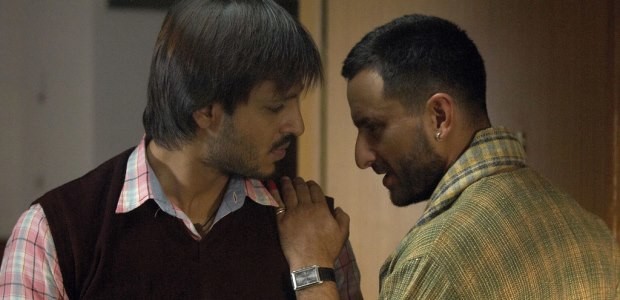I took only the masterline from Othello and sketched it from there on my own. I almost felt as if I had written it …only 400 years ago.- Vishal Bharadwaj
Haughty comment of a hack or simplistic fascination of an artist? A fairly new and art-house director with a star-cast to challenge any Yash Chopra production and an eight-figure production budget is not just a rarity in Indian cinema, but unheard of. What Bharadwaj ends up delivering with Omkara, his adaptation of Shakespeare’s Othello, is intelligent cinema with the accessibility of major commercial release (akin to a Batman Begins as a summer movie).
Omkara (Ajay Devgan) is a gang-leader in the semi-lawless state of Bihar. Bhaisaab’s (Naseer’s) election win promotes Omi to a position of more power, leaving his “Youth Leader” seat empty. In a logical political move, Omi selects Kesu Firangi (Vivek Oberoi) as his successor ignoring his loyal right-hand-man Langda Tyagi (Saif). Green with envy, Langda slowly poisons Omkara’s mind against Kesu leading him down a destructive path too dark for anyone’s good. Kareena, Konkona & Bipasha play Omi, Langda & Kesu’s love interests respectively.
The movie starts in the middle of an attempted wedding of a girl and carries on until she gets married. The events that transpire inbetween, the turns that different people take to affect her life and the eventual effect is Vishal Bharadwaj’s unique Omkara. The title of his second Shakespearean movie (after the fantastic Maqbool for Macbeth) went through a few changes before finally resting on the movie’s Othello equivalent. But this movie could easily have also been called “Dolly Mishra” or “Langda Tyagi”. These three characters equally occupy our minds with their unpredictable fates and yet it is the triumph of Saif Ali Khan’s powerfully vile performance of Shakespeare’s Iago as a limp Tyagi that towers head and shoulders above the powerful performances around him.
Vishal writes the Screenplay & Dialogues, composes music, sings and directs in just his fourth movie, only to strengthen the silent promise his made to his fans of greater things to come. Missing are the escapist dream sequences and melodramatic dialogues that Hindi movies are generally associated with. He instead roots the movie in realism with even the song-and-dance sequences being what exist in a real-world rural India. Do be aware though : the setting of the story in rural north-India requires the vocabulary to be, and is therefore, quite explicit in an authentic depiction of the conversational style of the region.
Anyone who has followed Indian cinema since the 70s will note the clear influence in Vishal’s work-style from his previous two movies. It does help to have this influence (Gulzar) as the lyricist of the movie and (my guess) a quiet advisor too. The most clear indication of this is in the dialogues and the style of sparsely sprinkled humour.
If you have not seen an Indian movie in a long time, this is the one to break your hiatus with.
Rating: 




https://www.youtube.com/watch?v=I3sbH2bjZ2w
